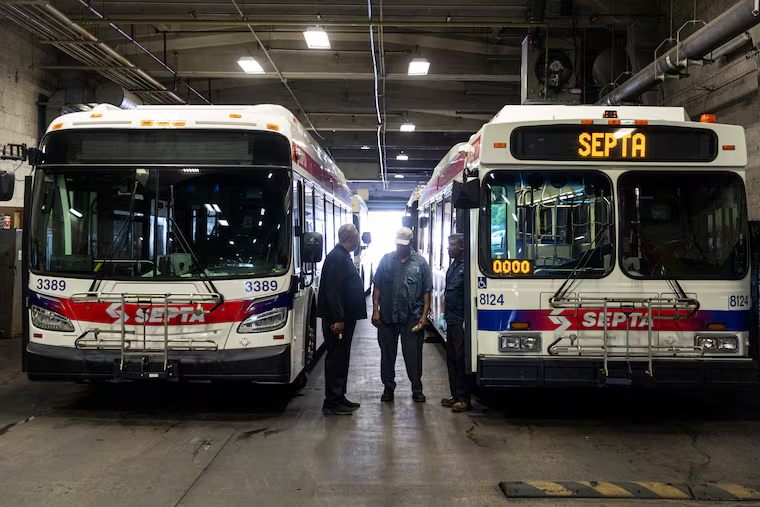SEPTA strike looms as both sides prepare for marathon bargaining session
“I don’t want to strike, but we’ll do it if we have to. The clock is ticking," said the union president.

» READ MORE: Update: SEPTA strike averted as TWU 234 reaches tentative deal
Contract talks between SEPTA and its largest union, Local 234 of the Transport Workers, are “going nowhere fast,” said Brian Pollitt, the union’s president, with little progress despite regular meetings since mid-July.
Starting Monday, negotiators for the transit agency and the union will sequester in a hotel conference room for marathon bargaining on a new contract for the operators, mechanics, cashiers and maintenance people who make Philadelphia’s transit run.
The deadline is 11:59 p.m. Oct. 31, when the current contract expires. Local 234 members voted earlier this month to authorize a strike if no agreement is reached by then and union leaders decide it is necessary.
“The members gave me the green light,” Pollitt said. “I don’t want to strike, but we’ll do it if we have to. The clock is ticking.”
“There has been progress in the contract negotiations with TWU Local 234,” SEPTA spokesman Andrew Busch said in a statement. “Since the first meeting in July, SEPTA’s labor negotiating team has met with the union 21 times in-person, and 17 comprehensive proposals have been exchanged.”
As negotiations more to the hotel, the transit agency’s team “will be available to talk around the clock,” he said.
SEPTA is known as one of the most strike-prone large transit systems in the country — unions have walked off the job at least 11 times since 1975. Although ridership has been down since the pandemic, hundreds of thousands of people use the transit system daily. A strike would snarl the region’s roads in traffic and could hurt economic activity.
What Local 234 wants
Pollitt says the union wants to increase the $20.14 starting wage for newly hired operators and bring members to the top hourly rate hourly rate of $33.54 in three years instead of the current 48 months. Local 234 also wants a cost-of-living boost to the negotiated annual increases members get.
It’s a matter of recruitment and retention amid a severe shortage of operators as the job has grown more difficult, Pollitt said.
SEPTA has 800 positions unfilled across the agency, TWU says — most in jobs its members do. In addition, 700 TWU members have reached 30 years of service or age 62 and qualify for pension benefits, Pollitt said.
A commercial driver’s license is “a gold mine in your pocket,” Pollitt said, adding a rookie operator with one could make about $28 an hour to start at UPS, FedEx or Amazon. “And they don’t have to deal with all the problems of working in mass transit.”
Local 234′s current contract, from 2021, included 3% annual raises, pandemic hazard pay, and two weeks of paid parental leave (alongside a separate leave provision for pregnancy and childbirth.)
SEPTA’s financial future
Both sides have an incentive to reach a deal: SEPTA can ill afford the disruption of a strike and the lost fare revenue from riders, given its uncertain financial position.
The authority projects an annual operating deficit of $240 million beginning next July 1 as the last of its federal pandemic aid is spent, a situation dubbed the “fiscal cliff” that afflicts most transit systems in the United States.
SEPTA and the state’s other public transit agencies are pushing for the legislature to adopt a measure that would give them a greater share of the sales tax to support operations.
The transit authority is also in contract talks with three other unions: the Fraternal Order of Transit Police, Lodge 109; the Brotherhood of Locomotive Engineers and Trainmen, Division 71, which represents Regional Rail engineers; and the union that represents conductors on the commuter-rail system, Local 61 of the International Sheet Metal, Air, Rail and Transportation Union (SMART).
Negotiations so far
Union officials say there’s been no progress on TWU’s demands that the transit agency be more aggressive with crime and antisocial behavior to better serve its members and the public.
“I want them to secure our system like they secure 1234 [Market] where the bigwigs work,” Pollitt said. “While we’re out working and dealing with the problems of society, they are in the penthouse.”
TWU officials also proposed that members handle warranty work in house on the 300 new buses on order, rather than subcontract it. Pollitt said Local 234 worked with Community College of Philadelphia and Bucks County Community College to set up a training program to grow the next generation of bus mechanics, but SEPTA officials nixed the idea.
“It went down like a kamikaze,” Pollitt said. SEPTA told union bargainers it wanted flexibility.
Pollitt did not rule out a short contract extension if an agreement appeared in sight at deadline.
This story has been updated to correct the top hourly wage for transit operators and clarify Local 234′s wage proposal.